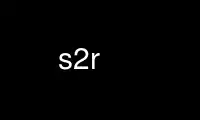
This is the command s2r that can be run in the OnWorks free hosting provider using one of our multiple free online workstations such as Ubuntu Online, Fedora Online, Windows online emulator or MAC OS online emulator
PROGRAM:
NAME
s2r - Process mapping from symbolic layout to physical layout
SYNOPSIS
s2r [-tc1rv] source [result]
DESCRIPTION
The goal of s2r is to perform the translation from the symbolic layout to physical layout
for the foundry. s2r uses a technolgy file whose name is defined by the environnement
variable RDS_TECHNO_NAME.
Some cells, like I/O pads, are specific to a given foundry. In the symbolic methodology,
these cells are phantom cells. It means that only their abutment box and and connectors
are present. s2r wil substitute physical cells to the symbolic phamtom cells. Beware,
this implies that the manufacturer cells must be modified by hand to ensure the abutment
box is a symbolic grid step multiple, and that the real connectors are centered on
symbolic grid.
In order for the replacement to work well, the physicals cells must have the abutment box
lower left corner at coordinate (0,0) The name of cells to be replaced are written in the
catalog file with the G attribute, see catal(5) for details on that file. See also
ring(1) for more on pads. Ouput can be generated in either cif or gds formats, to fit the
manufacturer requirements.
Mainly two kinds of users are concerned with s2r :
experts they should be able to parametrize the technology file for a new
process technology file is described in techno(5).
designers they are not directly concerned with the target process, but need to
be able to compute real capacitances for simulation.
The source argument is the name of the symbolic layout file to be translated. The
optional result argument indicates the name to be given to the real layout output. This
name is also the name of the top level model of the layout hierarchy. If result name is
omitted, then source name is used.
Six environment variables must be set for proper usage of s2r, all of them having default
values, thus ensuring the possibility of using it ``as it is''.
MBK_IN_PH The input format for symbolic layout is given by this environment
variable. The possible values are cp, ap. Default is cp. See
MBK_IN_PH(1) for details.
MBK_CATA_LIB Sets the directories that are to be searched thru for reading files.
The seaching mecanism first look in MBK_WORK_LIB(1) MBK_WORK_LIB
defines the path where the generated file is saved. Make sure the
write permissions are set up correctly, otherwise no save will occur.
MBK_CATAL_NAME This indicates the name of the catalog file used for pad
substitution. For the appropriate syntax of this file, see catal(5).
RDS_IN Defines the format to be used as input for cell substitution. The
available ones are cif and gds (default one). The cells to be parsed
must not containt 45 degrees wires. If an unknown layer is
encountered, the entire cell will be skipped.
RDS_OUT Gives the format of the output file. This may be either cif or gds
(default is gds).
RDS_TECHNO_NAME This points to the technology file to be used for symbolic to real
translation. This file is in general shared between all the
designers. it is the full path name to the file location, with the
extension.
OPTIONS
Without option, s2r should produce a layout that fits for the foundry. Nevertheless, its
behaviour can be modified when invoked with the following options:
-t Suppress the denotching phase. s2r performs gap filling, denotching
in order to avoid DRC errors. This operation is time consuming. It
is mandatory for the foundry but not really useful for capacitance
evaluation.
-c Deletes connectors and node names at all hierarchy level. Theses
objects link the physical view and the logical view of a chip. If
simulation is to be done after physical mapping, connectors must
appear, so that the extractors and simulators can use them. This
must not be used when preparing a final layout for the foundry.
For the factory, the top level connectors are forbidden, since they
do not represent any physical reality.
-1 Creates the top level cell with the instances as black boxes. This
may be useful for hierarchical extractors, since the file size may be
greatly reduced.
-r does not replace black boxes. Cells flagged with the G attribute in
the catal(5) file will not be replaced by their equivalent layout
loaded from disk.
-v verbose mode on.
EXAMPLES
You should first have a correct execution environment :
It is recommanded to put it in the ``.cshrc'' file if in c shell, as in the example
below.
setenv MBK_IN_PH ap
setenv MBK_WORK_LIB ~fred/mbk/layout
setenv MBK_CATA_LIB ~franck/s2r:/alliance/cells
setenv MBK_CATAL_NAME catalog
setenv RDS_TECHNO_NAME /labo/etc/prol15.rds
setenv RDS_IN gds
setenv RDS_OUT gds
s2r -c na2_y
This invocation will produce the cell na2_y from the standard cell library in real
layout, without connectors, scotches if needed, in gds format.
Use s2r online using onworks.net services
